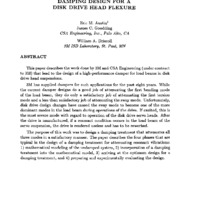-
Title
-
Damping Design for a Disk Drive Head Flexure
-
Description
-
This paper describes the work done by 3M and CSA Engineering (under contract to 3M) that lead to the design of a high-performance damper for load beams in disk drive head suspensions.
3M has supplied dampers for such applications for the past eight years. While the current damper designs do a good job of attenuating the first bending mode of the load beam, they do only a satisfactory job of attenuating the first torsion mode and a less than satisfactory job of attenuating the sway mode. Unfortunately, disk drive design changes have caused the sway mode to become one of the more dominant modes in the load beam during operations of the drive. If excited, this is the most severe mode with regard to operation of the disk drive servo heads. After the drive is manufactured, if a resonant condition occurs in the load beam of the servo suspension, the drive is rendered useless and has to be reworked.
The purpose of this work was to design a damping treatment that attenuates all three modes in a satisfactory manner. The paper describes the four phases that are typical in the design of a damping treatment for attenuating resonant vibrations: 1) mathematical modeling of the undamped system, 2) incorporation of a damping treatment into the mathematical model, 3) arriving at the optimum design for a damping treatment, arid 4) preparing and experimentally evaluating the design.
-
Creator
-
Austin, Eric M.
-
Driscoll, William A.
-
Publisher
-
Wright-Patterson Air Force Base, OH : Wright Laboratory, Flight Dynamics Directorate, Air Force Systems Command
-
Date
-
1991
-
Format
-
1 online resource (27 pages) : ill.
-
Type
-
article
-
Abstract
-
This paper describes the work done by 3M and CSA Engineering (under contract to 3M) that lead to the design of a high-performance damper for load beams in disk drive head suspensions.
3M has supplied dampers for such applications for the past eight years. While the current damper designs do a good job of attenuating the first bending mode of the load beam, they do only a satisfactory job of attenuating the first torsion mode and a less than satisfactory job of attenuating the sway mode. Unfortunately, disk drive design changes have caused the sway mode to become one of the more dominant modes in the load beam during operations of the drive. If excited, this is the most severe mode with regard to operation of the disk drive servo heads. After the drive is manufactured, if a resonant condition occurs in the load beam of the servo suspension, the drive is rendered useless and has to be reworked.
The purpose of this work was to design a damping treatment that attenuates all three modes in a satisfactory manner. The paper describes the four phases that are typical in the design of a damping treatment for attenuating resonant vibrations: 1) mathematical modeling of the undamped system, 2) incorporation of a damping treatment into the mathematical model, 3) arriving at the optimum design for a damping treatment, arid 4) preparing and experimentally evaluating the design.
-
Date Issued
-
1991-08
-
Extent
-
27
-
Corporate Author
-
GSA Engineering, Inc.
-
3M ISD Laboratory
-
Laboratory
-
Wright Laboratory
-
Report Number
-
WL-TR-91-3078 Volume II, pages EDC-1 to EDC-27
-
DoD Project
-
2401
-
DoD Task
-
240104
-
Distribution Conflict
-
No
-
Photo Quality
-
Undetermined
-
Distribution Classification
-
1
-
Report Availability
-
Full text available
-
Provenance
-
University of Colorado Colorado Springs, Kraemer Family Library
-
Identifier
-
ADA241312
